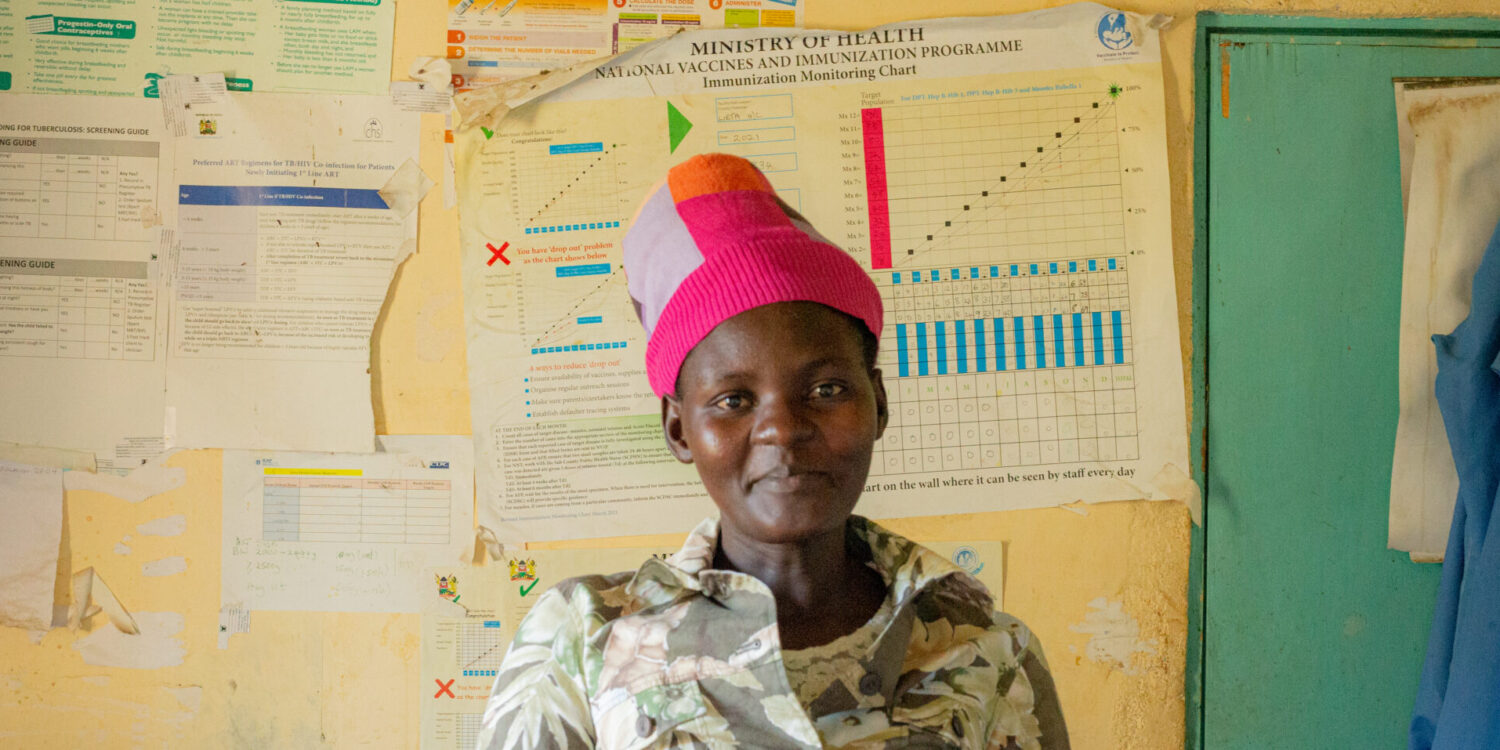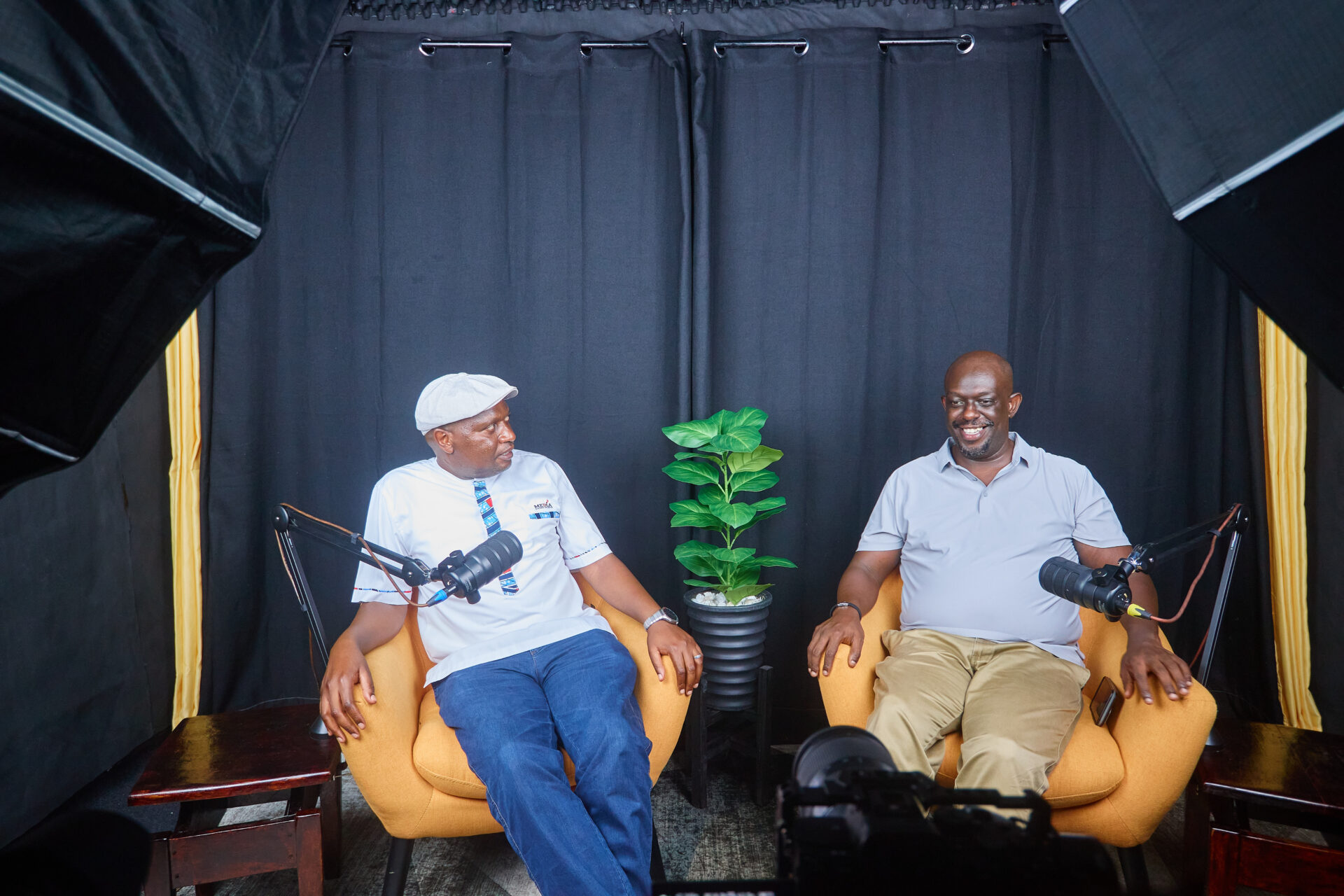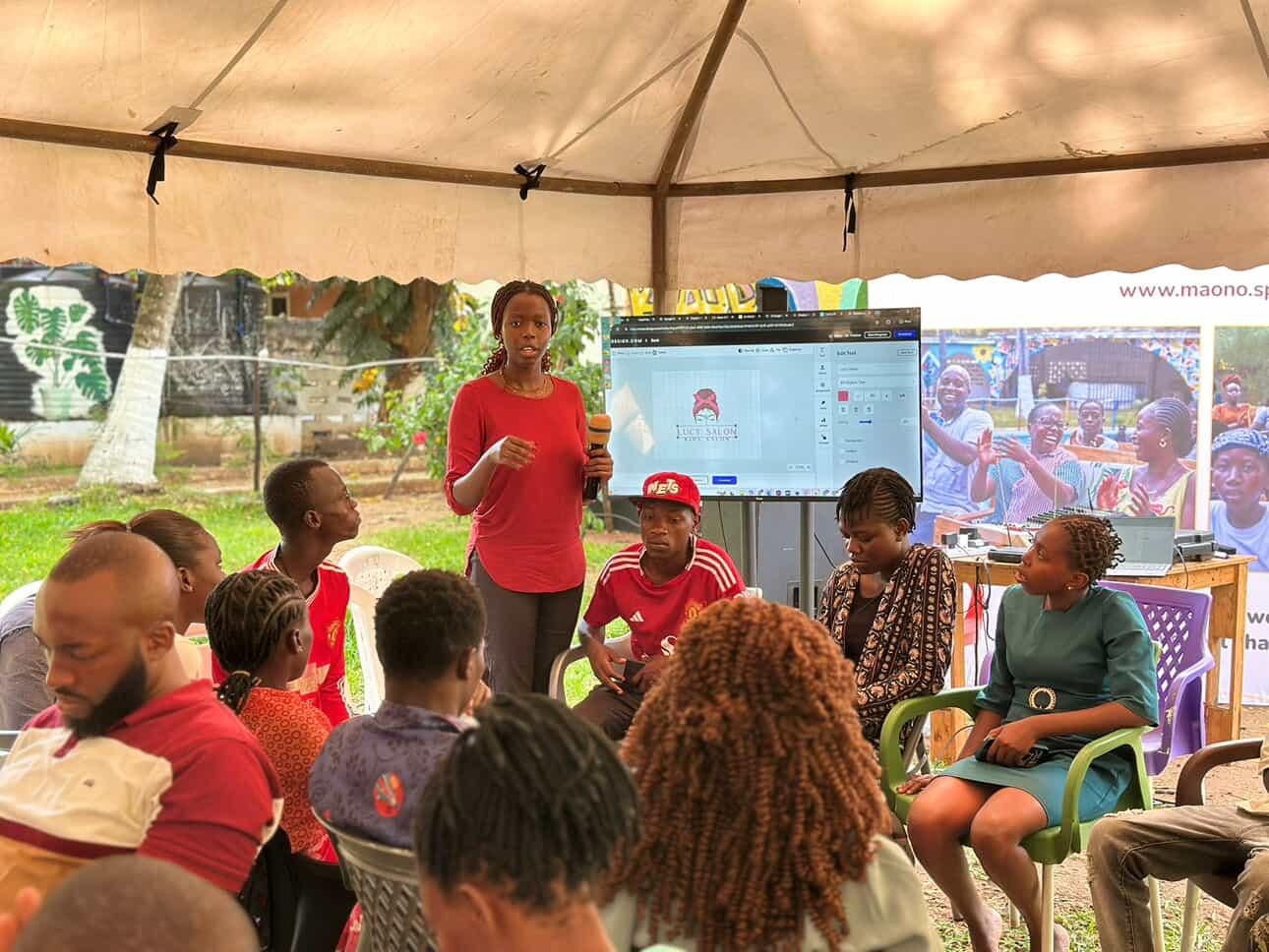In 2015, the world united behind 17 ambitious Sustainable Development Goals (SDGs) with the aim of eradicating poverty, tackling inequalities, and addressing climate change by 2030. It was a bold vision for a fairer, more sustainable world. Yet, as we near the end-point, the progress toward these goals tells a troubling story. According to the latest update from the United Nations, over 50% of SDG targets are seeing insufficient progress, while 30% have stalled or even reversed. This setback is driven by a combination of global crises—COVID-19, climate change, and the war in Ukraine—that have deepened existing inequalities and left the most vulnerable communities struggling to recover.
The COVID-19 pandemic alone has undone nearly a decade of progress on life expectancy. In 2022, the World Bank found that 712 million people were living in extreme poverty, surviving on less than $2.15 per day. This is a rise of 23 million people from 2019. The impacts of the pandemic, compounded by conflicts, economic turmoil, and climate shocks, have driven over 100 million more people into hunger compared to 2019. Sub-Saharan Africa, which represents 16% of the world’s population, now accounts for 67% of those living in extreme poverty. Poverty rates in fragile and conflict-affected countries are even higher.
The SDGs, particularly those related to poverty and hunger, are not just in danger, they are already failing. Time is running out, and as the Under-Secretary-General for Economic and Social Affairs Li Junhua clearly stated,
“The time for words has passed. The political declaration of the SDG Summit must be translated into actions.”
The clock is ticking, and we need more than just good intentions to create the change we promised to the world’s most vulnerable.
A Mixed Bag of Progress: Where SDGs Have Succeeded and Where They’ve Stagnated
The Sustainable Development Goals Progress Chart 2024 offers a nuanced look at global advancements and ongoing challenges in achieving the 2030 Agenda for Sustainable Development. It provides insight into where significant progress has been made and where gaps persist.
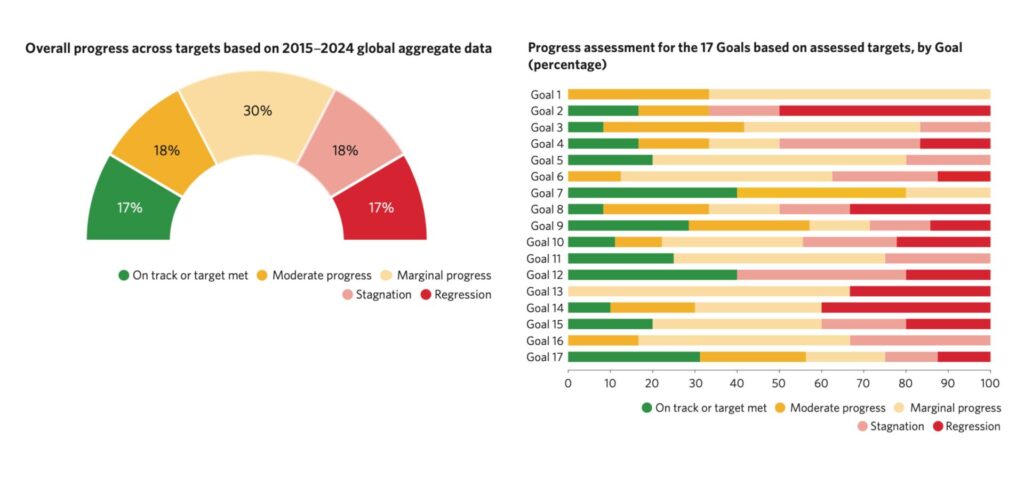
Success Stories
Despite the challenges, there have been notable successes:
- Hunger Reduction: Over the past two decades, the number of undernourished people worldwide has halved, especially in regions like Central and East Asia, Latin America, and the Caribbean. The Food and Agriculture Organization (FAO) reports that food security has improved in these areas through innovations in agricultural technology, infrastructure investments, and better access to markets. In Central and East Asia, countries like China have led the way with strategic agricultural investments, significantly reducing hunger levels in the region.
- Health Improvements: According to the World Health Organization (WHO), life expectancy at birth globally has risen from 66.8 years in 2000 to 73.4 years in 2020. Furthermore, global maternal mortality rates have decreased by 38% between 2000 and 2017, while the infant mortality rate has fallen dramatically. The battle against diseases such as HIV/AIDS and malaria has also made remarkable strides, with global deaths from malaria falling by 60% since 2000, thanks to widespread use of insecticide-treated bed nets and more effective treatments.
- Education Gains: Education has made significant progress, with improved literacy rates and increased enrollment in primary and secondary education. UNESCO reports that global adult literacy increased from 83% in 2000 to 90% in 2020. Sub-Saharan Africa, despite challenges such as conflict and gender inequality, has seen a rise in school attendance. A major achievement is the global gender parity in primary education, with greater access for girls and women.
Yet, progress is uneven. Over 800 million people are still undernourished, particularly in Sub-Saharan Africa, where conflict and climate change exacerbate hunger levels, health inequalities continue to persist, and millions of children remain out of school.
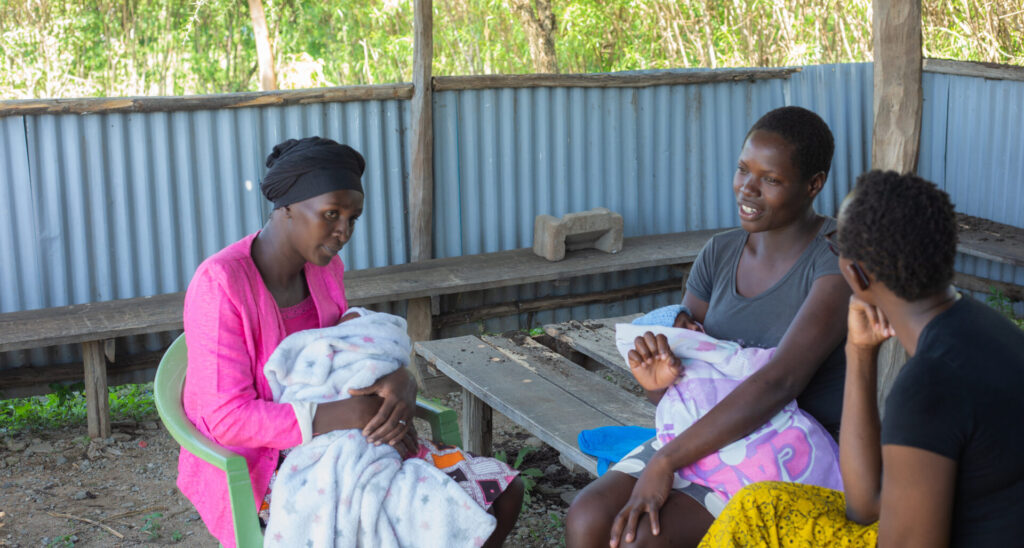
Mounting Challenges:
As the 2030 deadline for the Sustainable Development Goals (SDGs) draws near, the path to their achievement is increasingly obstructed by a series of complex challenges:
- Global Economic Downturn: Persistent economic pressures, including rising inflation and crippling debt in many developing nations, are deepening poverty and inequality. According to the World Bank, over 600 million people are still expected to live in extreme poverty by 2030. This stark projection highlights the inadequacy of current economic systems in addressing the fundamental needs of vulnerable populations.
- Democracy and Human Rights Regressions: The erosion of democratic values and human rights is another threat. Freedom House reports a troubling rise in authoritarian regimes, populism, and nationalism, which are undermining the global solidarity essential for achieving the SDGs. As civil liberties come under attack in many regions, active citizenship, the driving force behind change, is being stifled.
- Global Inequalities Between Nations: The disparity between nations remains one of the most significant barriers to SDG achievement. Low-income countries face overwhelming challenges in mobilizing resources, strengthening governance, and adopting advanced technologies. Financing gaps for low-income nations now exceed $4 trillion annually, indicating the inequitable access to resources and leaving poorer nations struggling to meet even the most basic development needs.
- Climate Inaction and Environmental Degradation: The climate crisis is perhaps the most urgent challenge. Despite international pledges, efforts to limit global warming to 1.5°C remain insufficient. The IPCC warns that this failure jeopardizes SDG 13 (Climate Action) and exacerbates environmental degradation, threatening the natural systems underpinning all other goals.
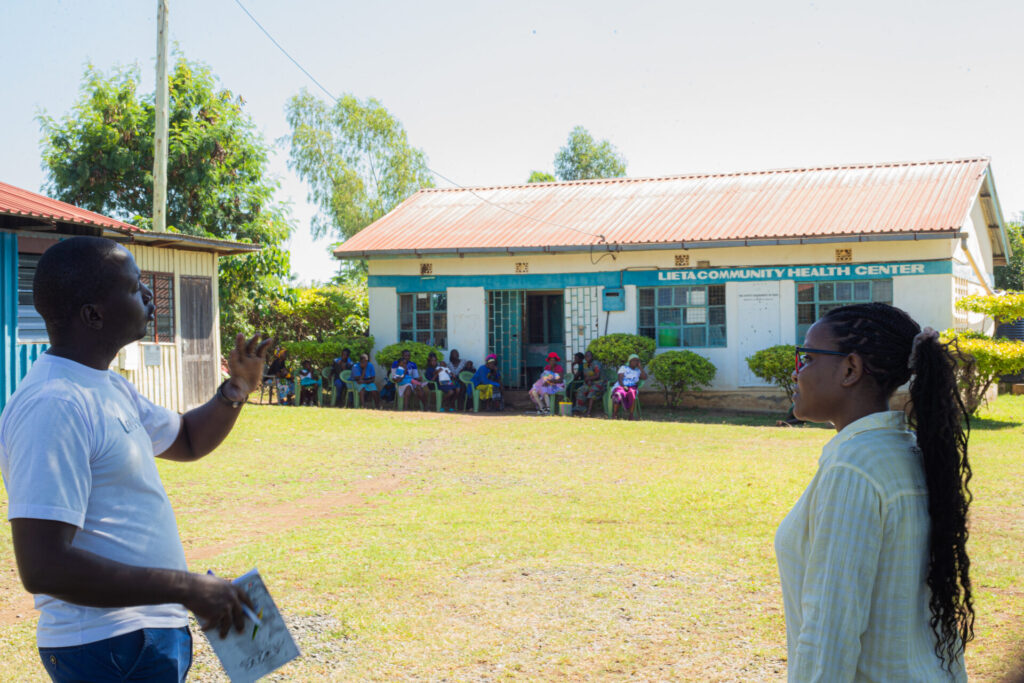
Can We Still Achieve the SDGs by 2030? What Needs to Happen?
If no action is taken, the answer is no, we cannot achieve the SDGs by 2030.
“Unless we act now, the 2030 Agenda will become an epitaph for a world that might have been,”
U.N. Secretary General Antonio Guterres
But, there are actionable ways to accelerate progress. A mix of innovative financing, multi-stakeholder collaboration, inclusive data collection, and long-term structural reforms can help bridge the gaps and push global efforts forward.
- Accelerating Progress Through Innovation
Scaling up interventions requires new approaches in financing, partnerships, and technology. At Maono Space, we support changemakers who are taking action to inspire positive, sustainable change in their communities. For example, Okoa Youth Organisation is leading the way in climate change action. Recognizing the risks waste collectors face while sifting through unsanitary dumpsites, they created Resafi, a tool that connects waste collectors directly with households and small businesses who sort their waste at the source. This approach makes the process safer, more efficient, and ensures collectors can earn a living with dignity and safety. We couldn’t be prouder of Okoa Youth for this forward-thinking, community-first solution.
- Citizen-Generated Data: Leaving No One Behind
Engaging citizens in data collection is key to ensuring that no one is left behind. Citizen-generated data (CGD) provides nuanced insights, enabling more inclusive and accurate tracking of SDG progress. Through our extensive years of experience collaborating with governments and marginalized communities across various Kenyan counties, we’ve observed that when these communities gain access to their own data, they become visible to government officials. This increased visibility allows officials to better understand the community’s needs and acquire a clearer perspective on how they can provide meaningful assistance.
- Youth Engagement and Marginalized Groups
Inclusion is central to sustainable progress. For instance, in Kenya, we are revolutionizing data governance and youth engagement by equipping changemakers at Maono Space with tools to collect and analyze data, helping them advocate for their rights and hold governments accountable. They have access to accounting, training, marketing, technology, and small grants that help them catalyze greater impact at the grassroots level.
- Long-Term Structural Changes
Investing in education and healthcare has ripple effects across multiple SDGs. As highlighted by UNESCO, education reforms can drive progress in poverty reduction, health outcomes, and inequality, creating a foundation for long-term, sustainable change.
- Imbalanced Budgets
Even within devolved systems like Kenya’s, national governments often retain significant control over budgets for locally managed functions. For example, healthcare, a devolved function, still sees the national government holding a disproportionate share of the budget, leaving counties struggling to meet their mandates. This imbalance undermines devolution and hinders local implementation of the SDGs.
- Post-SDGs Direction: Planning Beyond 2030
Looking beyond 2030, the Summit of the Future (2024) introduced two groundbreaking agreements: the Pact for the Future and the Global Digital Compact. These initiatives aim to address emerging challenges and reinforce the gains made under the SDGs, focusing on digital governance, financial system reforms, and universal social protections.
What Will Your Contribution Be?
The main goal of the 2030 Agenda for Sustainable Development is to ensure that no one is left behind. As civil society, we have a role to play in driving this global commitment. By working together with governments, communities, and the private sector, we can amplify efforts to address the most pressing issues, from poverty and hunger to inequality and climate change. Partnerships and collaboration are essential for scaling up solutions, sharing expertise, and mobilizing resources. Your contribution, whether through advocacy, funding, or grassroots initiatives, can help accelerate progress and bring about change – the change we promised to the world’s most vulnerable.
As we approach 2030, the question remains: What will your contribution be? Will you act now to ensure the promises made in 2015 are fulfilled, or will we look back with regret at what could have been done? The world is depending on us all to play our part in shaping a better future for generations to come.

